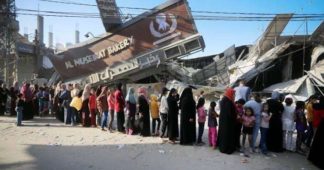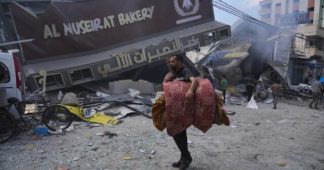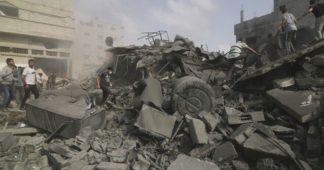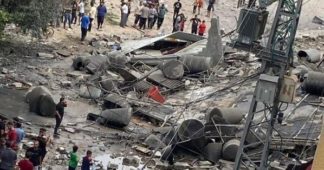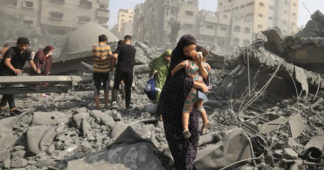Israel uses hunger as a weapon to collectively punish Palestinians in Gaza, says Geneva-based human rights group
December 20, 2023
According to a study conducted by Geneva-based Euro-Med Human Rights Monitor, over 71% of all Gazans are suffering from extreme hunger due to Israel using starvation as a weapon to collectively punish Palestinians in its war in Gaza.
The figure was obtained from an analytical study done by Euro-Med Monitor, among a sample of 1,200 people in Gaza, to assess the impact of the humanitarian crisis created by the Israeli war on the besieged Palestinian territory since October 7.
Close to 20,000 Palestinians have been killed and more than 60,000 have been injured in Israel’s indiscriminate bombings and ground offensive in Gaza so far. Almost 90% of its 2.3 million inhabitants have been displaced and forced to live in temporary shelters or in the open.
According to the findings by the Euro-Med Human Rights Monitor, 98% of Gazans are not getting sufficient food while 64% admitted that they are forced to eat expired materials, immature food, and even grass to survive.
A similar report has been published by the UN Office for the Coordination of Humanitarian Affairs (OCHA). It estimates that the percentage of families reporting severe hunger levels in Gaza has increased from 24% to 44% between 30 November and 12 December.
Israel has imposed a blockade on the supply of food and other essential materials inside the Palestinian territory since October 9. This has created a massive shortage of food and other essential material in the territory.
Israel agreed to allow limited humanitarian aid to the besieged territory after pressure from international agencies in late November. However, the supply of aid is hugely inadequate to fulfill the needs of millions of Palestinians in Gaza.
Before October 7, everyday, at least 500 trucks entered Gaza with food and other supplies. Even since Israel has allowed the delivery of humanitarian aid through Egypt’s Rafah border, on average only 100 trucks have entered the territory, the report notes.
“Israel’s use of starvation as a weapon has been intensified since October 7, and has included cutting off all food supplies to Gazans as well as bombing and destroying the strip’s bakeries, factories, food stores, water stations and tanks,” the Euro-Med report says.
The Israeli military has also bombed and burned agricultural fields, fishing boats, floor stores and even the supply centers of the international relief agencies such as United Nation Relief and Work Agency (UNRWA) in Gaza.
Targeting civilian infrastructure and food production during war is a crime under international law. Israeli acts in Gaza also violate its obligations under international law. As an occupying power, Israel has the responsibility to provide food and security to all the Palestinians.
Furthermore, it is extremely difficult to deliver the limited food aid to the affected Palestinians within Gaza as vehicles do not have enough fuel to operate.
Most of the Gazans are not getting enough water for drinking, cleaning and bathing as well. According to the findings of the survey, on an average most of the Gazans are only getting 1.5 liters of water a day. According to the international standards a person needs at least 16.5 liters of water a day to maintain a healthy life.
Most of the civil infrastructure including sewage and drinking water pipes have been destroyed due to the Israeli bombings. These services are also affected badly due to lack of electricity.
The impact of lack of drinking water is massive and clear. According to the findings at least 66% of all respondents reported have experienced some diseases directly related to water such as diarrhea, skin rashes, or intestinal diseases.
UNRWA head Philippe Lazzarini and UN Secretary General Antonio Guterres have repeatedly underlined the fact of the desperate humanitarian situation in Gaza, including increasing hunger and starvation caused due to the Israeli war and demanded an immediate ceasefire.
We remind our readers that publication of articles on our site does not mean that we agree with what is written. Our policy is to publish anything which we consider of interest, so as to assist our readers in forming their opinions. Sometimes we even publish articles with which we totally disagree, since we believe it is important for our readers to be informed on as wide a spectrum of views as possible.
